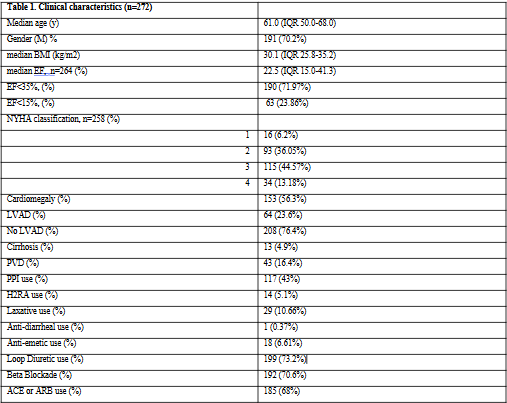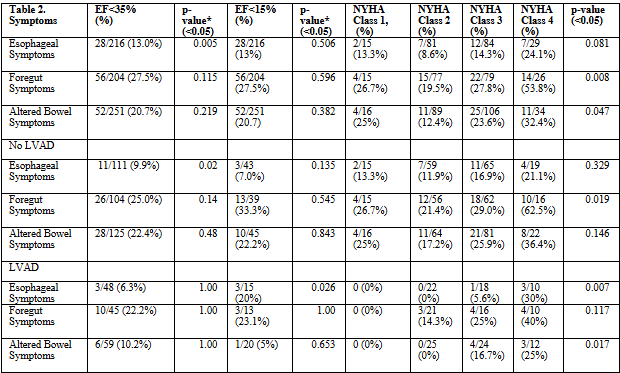Sunday Poster Session
Category: Colon
P0308 - New York Heart Association Classification Correlates With Gastroenterological Symptoms More Closely Than Ejection Fraction Alone
Sunday, October 26, 2025
3:30 PM - 7:00 PM PDT
Location: Exhibit Hall

Allison Franz, MD (she/her/hers)
University of Louisville
Louisville, KY
Presenting Author(s)
Allison Franz, MD1, Ethan R. Steele, DO2, Benjamin Rogers, MD, MS3, Rohan Samson, MD4
1University of Louisville, Louisville, KY; 2University of Louisville School of Medicine, Louisville, KY; 3University of Louisville Division of Gastroenterology, Hepatology, and Nutrition, Louisville, KY; 4University of Louisville, U of L Health, Heart Hospital, at Jewish Hospital, Louisville, KY
Introduction: Heart failure (HF) affects roughly 23 million people worldwide. Gastrointestinal (GI) manifestations of HF are common, with dysfunction of intestinal perfusion, permeability, gut microbiome, and inflammation as proposed mechanisms. Our study aims to determine whether clinically relevant cardiovascular evaluations can predict GI symptoms.
Methods: In this prospective study, we distributed symptom questionnaires to HF patients at a tertiary HF clinic from August to November 2024. The questionnaire was developed and validated at a tertiary motility clinic and assessed symptoms individually and grouped (esophageal (heartburn, dysphagia); foregut (abdominal pain, bloating, anorexia, vomiting, nausea); and bowel (constipation, diarrhea). Symptom severity was rated on a scale of 0-4. EMR’s were interrogated for relevant HF metrics and clinical characteristics, including medications, echocardiogram findings, and commonly used HF classifications.
Results: A total of 272 HF patients had data available during the study period. They were predominantly middle-aged (median 61.0y, IQR 50.0-68.0y), overweight (median BMI 30.1 kg/m2, IQR 25.8-35.2 kg/m2) men (191, 70.2%), and 23.6% of patients were status-post LVAD. A small subset of patients had cirrhosis (13, 4.9%) and many utilized GERD, laxative, or anti-diarrheal medications (Table 1).
Nausea and vomiting were rare, affecting 44 (14%) and 27 (6.1%) patients, respectively. More common was the presence of bloating (45, 16.4%) and abdominal pain (32, 12.3%). Heartburn and dysphagia were reported in 14.3% and 3.7%, respectively. Altered bowel habits were similarly uncommon, with 34 patients reporting diarrhea and 44 reporting constipation (12.9% and 16.9%, respectively).
Most individuals had radiographic evidence of cardiomegaly (153, 56.3%) and the median EF was 22.5% (IQR 15.0-42.5%). There was no relationship between cardiomegaly and the presence of esophageal, foregut, or bowel habit symptoms (p≥0.462). Peripheral edema similarly did not correlate with increased symptoms (p≥0.390). Although EF classified by severity at cutoffs of 15% and 35% did not reliably predict the presence of GI symptoms, NYHA classes did correlate with foregut symptoms (p=0.008) and was associated with altered bowel habits (p=0.047) (Table 2).
Discussion: NYHA classification was predictive of the presence of foregut and altered bowel symptoms. Further investigation into the comparative predictive value of HF metrics and classification schemes for GI symptoms are necessary.

Figure: Table 1. Cohort characteristics. Data presented as median (interquartile range) or number (%). BMI, body mass index; EF, ejection fraction, NYHA, New York Heart Association; LVAD, left ventricular assistive device; PVD, peripheral vascular disease; PPI, proton pump inhibitor; H2RA, histamine H2-receptor antagonist; ACE, angiotensin-converting enzyme inhibitors; ARB, angiotensin 2 receptor blockers.

Figure: Table 2. Analysis of grouped symptom burden (esophageal (heartburn, dysphagia); foregut (abdominal pain, bloating, anorexia, vomiting, nausea); and altered bowel (constipation, diarrhea) as predicted by EF classified by severity at cutoffs of 15% and 35% (Pearson chi-square analysis with Fishers exact test) and NYHA classes (Linear-by-linear association). Clinical significance was determined using a p-value of 0.05. Cohort data as well as LVAD and No LVAD patient subgroups were analyzed. *Compared to those with EF not meeting criteria.
Disclosures:
Allison Franz indicated no relevant financial relationships.
Ethan Steele indicated no relevant financial relationships.
Benjamin Rogers: Phathom – Speakers Bureau. Sanofi – Consultant.
Rohan Samson indicated no relevant financial relationships.
Allison Franz, MD1, Ethan R. Steele, DO2, Benjamin Rogers, MD, MS3, Rohan Samson, MD4. P0308 - New York Heart Association Classification Correlates With Gastroenterological Symptoms More Closely Than Ejection Fraction Alone, ACG 2025 Annual Scientific Meeting Abstracts. Phoenix, AZ: American College of Gastroenterology.
1University of Louisville, Louisville, KY; 2University of Louisville School of Medicine, Louisville, KY; 3University of Louisville Division of Gastroenterology, Hepatology, and Nutrition, Louisville, KY; 4University of Louisville, U of L Health, Heart Hospital, at Jewish Hospital, Louisville, KY
Introduction: Heart failure (HF) affects roughly 23 million people worldwide. Gastrointestinal (GI) manifestations of HF are common, with dysfunction of intestinal perfusion, permeability, gut microbiome, and inflammation as proposed mechanisms. Our study aims to determine whether clinically relevant cardiovascular evaluations can predict GI symptoms.
Methods: In this prospective study, we distributed symptom questionnaires to HF patients at a tertiary HF clinic from August to November 2024. The questionnaire was developed and validated at a tertiary motility clinic and assessed symptoms individually and grouped (esophageal (heartburn, dysphagia); foregut (abdominal pain, bloating, anorexia, vomiting, nausea); and bowel (constipation, diarrhea). Symptom severity was rated on a scale of 0-4. EMR’s were interrogated for relevant HF metrics and clinical characteristics, including medications, echocardiogram findings, and commonly used HF classifications.
Results: A total of 272 HF patients had data available during the study period. They were predominantly middle-aged (median 61.0y, IQR 50.0-68.0y), overweight (median BMI 30.1 kg/m2, IQR 25.8-35.2 kg/m2) men (191, 70.2%), and 23.6% of patients were status-post LVAD. A small subset of patients had cirrhosis (13, 4.9%) and many utilized GERD, laxative, or anti-diarrheal medications (Table 1).
Nausea and vomiting were rare, affecting 44 (14%) and 27 (6.1%) patients, respectively. More common was the presence of bloating (45, 16.4%) and abdominal pain (32, 12.3%). Heartburn and dysphagia were reported in 14.3% and 3.7%, respectively. Altered bowel habits were similarly uncommon, with 34 patients reporting diarrhea and 44 reporting constipation (12.9% and 16.9%, respectively).
Most individuals had radiographic evidence of cardiomegaly (153, 56.3%) and the median EF was 22.5% (IQR 15.0-42.5%). There was no relationship between cardiomegaly and the presence of esophageal, foregut, or bowel habit symptoms (p≥0.462). Peripheral edema similarly did not correlate with increased symptoms (p≥0.390). Although EF classified by severity at cutoffs of 15% and 35% did not reliably predict the presence of GI symptoms, NYHA classes did correlate with foregut symptoms (p=0.008) and was associated with altered bowel habits (p=0.047) (Table 2).
Discussion: NYHA classification was predictive of the presence of foregut and altered bowel symptoms. Further investigation into the comparative predictive value of HF metrics and classification schemes for GI symptoms are necessary.

Figure: Table 1. Cohort characteristics. Data presented as median (interquartile range) or number (%). BMI, body mass index; EF, ejection fraction, NYHA, New York Heart Association; LVAD, left ventricular assistive device; PVD, peripheral vascular disease; PPI, proton pump inhibitor; H2RA, histamine H2-receptor antagonist; ACE, angiotensin-converting enzyme inhibitors; ARB, angiotensin 2 receptor blockers.

Figure: Table 2. Analysis of grouped symptom burden (esophageal (heartburn, dysphagia); foregut (abdominal pain, bloating, anorexia, vomiting, nausea); and altered bowel (constipation, diarrhea) as predicted by EF classified by severity at cutoffs of 15% and 35% (Pearson chi-square analysis with Fishers exact test) and NYHA classes (Linear-by-linear association). Clinical significance was determined using a p-value of 0.05. Cohort data as well as LVAD and No LVAD patient subgroups were analyzed. *Compared to those with EF not meeting criteria.
Disclosures:
Allison Franz indicated no relevant financial relationships.
Ethan Steele indicated no relevant financial relationships.
Benjamin Rogers: Phathom – Speakers Bureau. Sanofi – Consultant.
Rohan Samson indicated no relevant financial relationships.
Allison Franz, MD1, Ethan R. Steele, DO2, Benjamin Rogers, MD, MS3, Rohan Samson, MD4. P0308 - New York Heart Association Classification Correlates With Gastroenterological Symptoms More Closely Than Ejection Fraction Alone, ACG 2025 Annual Scientific Meeting Abstracts. Phoenix, AZ: American College of Gastroenterology.
